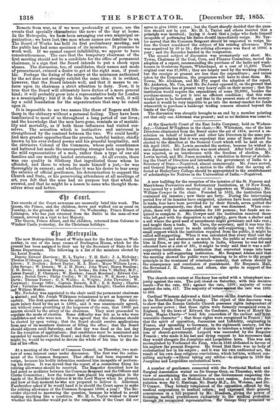Remote from war, as if we were profoundly at peace,
are the events that specially charatterize the news of the day at home. In the Metropolis, we late been arranging our own municipal or- ganization; we have lost tere men whose names are familiar to us. The Board of Works has held its first preliminary meeting, and the public has had some specimen of its members. It promises to Work well. If we cannot expect infallibility, we appear to have conscientiousness. The care that the temporary chairman of the first meeting should not be a candidate for the office of permanent chairman, is a sign that the Board intends to put a check upon abuses. The discussion, too, of candidates, their names and mode of presentment, evinced a desire to get at the right man, if possi- ble. Perhaps the fixing of the salary at the minimum authorized by the act does not strongly exhibit the same idea; it is evident, however, that the Board intends well, and that it means to en- force upon its chairman a strict attention to duty. Now, it is true that the Board will ultimately have duties of a more general kind ; it will probably grow into a representative body for London as a municipality : but if it do this its earlier work well, it will lay a solid foundation for the superstructure that may be raised upon it.
It is impossible to see two names like those of Rogers and Sib- thorp in the obituary without a personal feeling. They have been familiarized to most of us throughout a long period of our lives ; and the knowledge that the men have gone, reminds us of mutabi- lity and mortality, as if both these influences had visited our- selves. The sensation which is instinctive and universal is strengthened by the contrast between the two. We could hardly find men greater opposites than the precise, tasteful banker, chiefly known by his over-refined poems and his graceful hospitality, and the obtrusive Colonel of the Commons, whose pale countenance and battered hat made the unsuspecting stranger look upon him as the wild representative of a mob, rather than a type of our old families and our wealthy landed aristocracy. At all events, there was one quality in Sibthorp that ingratiated those whom he Offended, and those to whom he made himself a jest,—he was thoroughly in earnest; and whether it was his desire to tear away the salaries of official gentlemen, his determination to support the Church and State, or his persevering attendance at all meetings of art, you felt that the man had no purpose but that which he avowed, and that he might be a lesson to some who thought them- selves wiser and better.


































 Previous page
Previous page